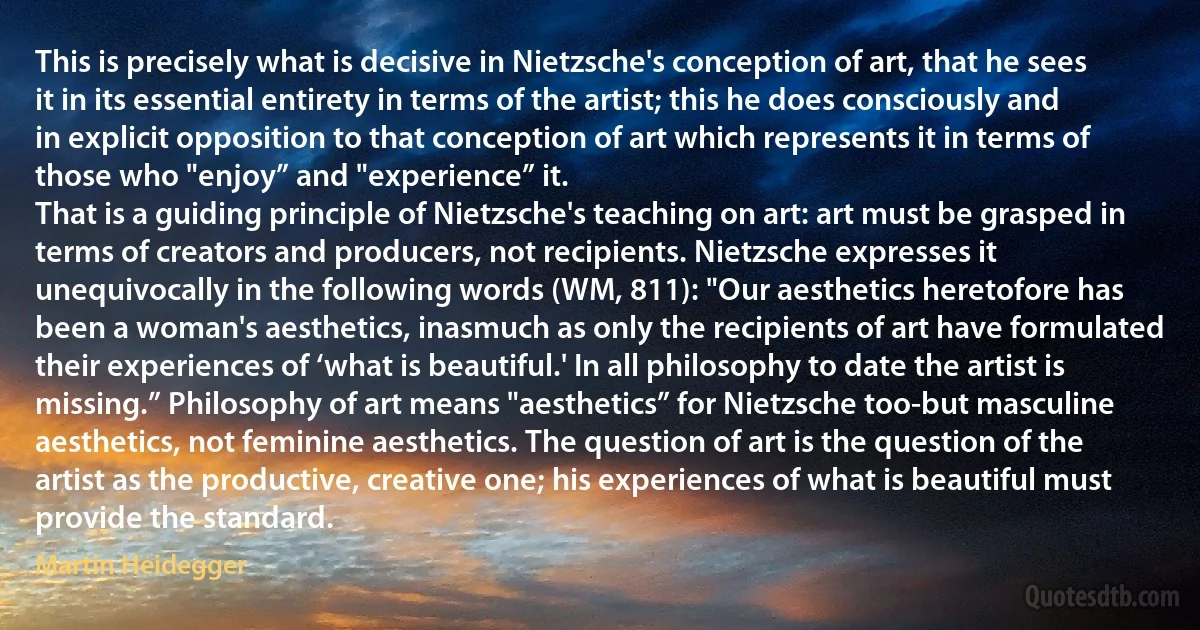
This is precisely what is decisive in Nietzsche's conception of art, that he sees it in its essential entirety in terms of the artist; this he does consciously and in explicit opposition to that conception of art which represents it in terms of those who "enjoy” and "experience” it. That is a guiding principle of Nietzsche's teaching on art: art must be grasped in terms of creators and producers, not recipients. Nietzsche expresses it unequivocally in the following words (WM, 811): "Our aesthetics heretofore has been a woman's aesthetics, inasmuch as only the recipients of art have formulated their experiences of ‘what is beautiful.' In all philosophy to date the artist is missing.” Philosophy of art means "aesthetics” for Nietzsche too-but masculine aesthetics, not feminine aesthetics. The question of art is the question of the artist as the productive, creative one; his experiences of what is beautiful must provide the standard.
Martin HeideggerRelated topics
aesthetics art beautiful conception creative entirety experience explicit following question teaching means words nietzscheRelated quotes
Unfortunately... the philosophy of Aristotle laid it down as a principle, that the celestial motions were regulated by laws proper to themselves, and bearing no affinity to those which prevail on earth. By thus drawing a broad and impassable line of separation between celestial and terrestrial mechanics, it placed the former altogether out of the pale of experimental research, while it at the same time impeded the progress of the latter by the assumption of principles respecting natural and unnatural motions, hastily adopted from the most superficial and cursory and remark, undeserving even the name of observation. Astronomy therefore continued for ages a science of mere record, in which theory had no part, except in so far as it attempted to conciliate the inequalities of the celestial motions with that assumed law of uniform circular revolution which was alone considered consistent with the perfection of the heavenly mechanism.

John Herschel
At first we got along very well. Esipova even boasted outside the class that she had pupils who wrote sonatas (I completed Sonata, Op. 1, and played it to Esipova, who took it home and inserted pedaling). But before long trouble began. Esipova's method of teaching was to try to fit everyone into a standard pattern. True, it was a very elaborate pattern, and if the pupil's temperament coincided with her own, the results were admirable. But if the pupil happened to be of an independent cast of mind Esipova would do her best to suppress his individuality instead of helping to develop it. Moreover, I had great difficulty in ridding myself of careless playing, and the Mozart, Schubert and Chopin which she insisted on were somehow not in my line. At that period I was too preoccupied with the search for a new harmonic idiom to understand how anyone could care for the simple harmonies of Mozart.

Anna Yesipova
In Europe, you do philosophy by performing discourse on another guy's text, and so Derrida will go over Heidegger, and Habermas will extend Marx's corpus; but in America you could never get away with kinky stuff like that, for you have to generate philosophy from real things-like computers or television. You need to look at Omni magazine to get a feel for this new kind of mail-order, Popular Mechanics science of mind. It's full of articles about meditation helmets and downloading the soul into computers so that when your body wears out you can live forever. What is completely missing in Europe is precisely what you will find in America: namely, an electronic Umwelt in which history is replaced with movies, education is replaced with entertainment, and nature is replaced with technology. This peculiar wedding of low kitsch and high tech generates a posthistoric world that no European literary intellectual can quite fathom.

William Irwin Thompson
I think it was my grandmother who gave me my ease in being a woman. She was unquestionably feminine - small and dainty and pretty and wholly without masculine protest or feminist aggrievement. She had gone to college when this was a very unusual thing for a girl to do, she had a very firm grasp of anything she paid attention to, she had married and had a child, and she a career of her own. All this was true of my mother as well. But my mother was filled with passionate resentment about the condition of women, as perhaps my grandmother might have been had my grandfather lived and had she borne five children and had little opportunity to use her special gifts and training. As it was, the two women I knew best were mothers and had professional training. So I had no reason to doubt that brains were suitable for a woman. And as I had my father's kind of mind - which was also his mother's - I learned that the mind is not sex-typed.

Margaret Mead
Nietzsche proposes the following brilliant hypothesis: The bad conscience is the deep-seated morbid condition that declared itself in man under the stress of the most radical change he has ever experienced when he found himself imprisoned in perpetuity within a society which was in- violable. All the strong and savage instincts such as adventurousness, rashness, cunning, rapacity, lust of power, which till then had not only been honoured, but actually encouraged, were suddenly put down as dangerous, and by degrees branded as immoral and criminal. Creatures adapted to a roving life of war and adventure suddenly saw all their instincts classed as worthless, nay, as forbidden. An immense despondency, a dejection without parallel, then took possession of them. And all these instincts that were not allowed an outward vent, turned inwards on the man himself feelings of enmity, cruelty, ... violence, persecution, destruction and thus the bad conscience originated.

Georg Brandes
